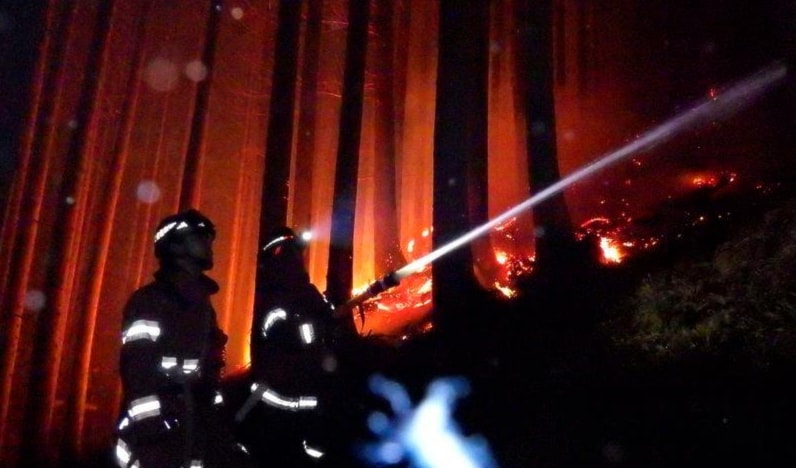Rain falls on Japan as it battles its most severe wildfire in 50 years
As thousands are evacuated and thousands more attempt to contain the Japan wildfire, snow and rain interfere to offer the country hope.
-

Firefighters battling a wildfire near the city of Ofunato, Iwate prefecture, Japan. (AFP)
Japan is grappling with its most severe wildfire in nearly 50 years, as a massive blaze continues to devastate the northern city of Ofunato.
The fire, which has been raging for over a week, has scorched approximately 2,900 hectares (7,170 acres) of land—making it the country’s largest wildfire since at least 1975. One person has died, and nearly 4,000 residents have been forced to evacuate.
The fire erupted in an area experiencing record-low rainfall, with Ofunato receiving just 2.5 millimeters of rain in February—its driest month on record. However, much-needed rain and snowfall on Wednesday brought a glimmer of hope for firefighters battling the flames.
Firefighters from 14 Japanese regions, including units from Tokyo, were engaged in battling the blaze, with 16 helicopters, including those from the military, making efforts to douse the flames. However, the rugged terrain, with its steep slopes and narrow roads, has complicated containment efforts.
Evacuees are sheltering in makeshift centers, where food and water are being distributed. Fumiko Tanaka, 69, described the terror of escaping the fire, saying "Fires are the scariest disaster, because they spring from one place to another, so you don't know where to run," she said, expressing hope that her home would be spared.
Some local businesses have stepped in to help. The owner of a hot spring inn, Toyoshige Shida, has opened his facility to evacuees free of charge, recalling the struggles of those displaced by the 2011 earthquake and tsunami.
Climate change makes the 'unusual' a reality
Japan has seen a decline in wildfires since their peak in the 1970s, but the country still recorded about 1,300 incidents last year—mostly in the dry months of February to April. Experts warn that climate change is exacerbating extreme weather, with rising temperatures making wildfires more frequent and severe.
Former Australian fire commissioner Greg Mullins noted that Japan’s fire, along with recent wildfires in Los Angeles, is unusual for winter. "In both cases the fires were preceded by hot summers, which increased evaporation and drying of vegetation, followed by large rainfall deficits that parched the landscape," he said, adding that as the climate crisis worsens, it is expected for wildfires to become a problem where they hadn't usually been.
Ofunato’s mayor, Kiyoshi Fuchigami, acknowledged the scale of the challenge. "The fact that teams of firefighters are being reinforced every day, and that the fire has been going on for a week, shows the extent of the dry weather and the difficulties we are facing," he said.
For now, residents and emergency crews hope that incoming wet weather will provide the relief they desperately need.

 3 Min Read
3 Min Read









